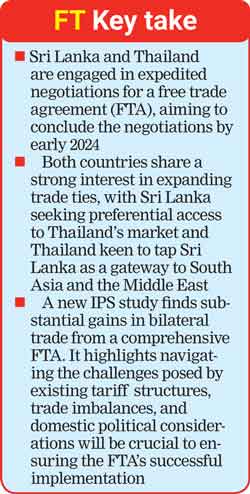Friday Feb 27, 2026
Friday Feb 27, 2026
Saturday, 16 September 2023 00:46 - - {{hitsCtrl.values.hits}}
 Sri Lanka and Thailand are engaged in expedited negotiations for a free trade agreement (FTA) to enhance bilateral trade, facilitate trade activities, and promote investments. The two nations aim to complete the discussion rounds by the beginning of 2024. A new publication by the Institute of Policy Studies of Sri Lanka (IPS) delves into the potential benefits and challenges of this proposed FTA.
Sri Lanka and Thailand are engaged in expedited negotiations for a free trade agreement (FTA) to enhance bilateral trade, facilitate trade activities, and promote investments. The two nations aim to complete the discussion rounds by the beginning of 2024. A new publication by the Institute of Policy Studies of Sri Lanka (IPS) delves into the potential benefits and challenges of this proposed FTA.
The study titled ‘Unveiling Trade Potential: An Ex-Ante Analysis of the Sri Lanka-Thailand Free Trade Agreement’ by IPS Research Fellow Dr. Asanka Wijesinghe and IPS Research Officer Nilupulee Rathnayake offers valuable insights into current tariff structures, bound tariffs, binding overhangs, and the development of offensive lists for both nations, to provide crucial insights for policymakers, trade negotiators, and businesses. Using a comprehensive analytical framework, simulations were conducted for 47 Global Trade Analysis Projects (GTAP) sectors, incorporating sector-specific Armington elasticities to enhance the accuracy of the estimates.
The study highlights the structural differences in the economies of Sri Lanka and Thailand, which bring opportunities and pose challenges from a bilateral trade deal. The analysis reveals that both countries have relatively high tariffs in sectors where the other country has a comparative advantage. For example, Thailand imposes significant tariffs on Sri Lanka’s wearing apparel and tea exports, while Sri Lanka maintains high tariffs on Thailand’s vehicle and parts, rubber products, and light electronics exports. Additionally, trade policy uncertainty exists, mainly due to Sri Lanka’s lower binding coverage, resulting in a binding overhang of 33.1% in agricultural exports from Thailand.
The partial equilibrium analysis predicts a substantial 38% increase in Sri Lanka’s exports to Thailand if tariffs are eliminated, with the wearing apparel and tea sectors poised to benefit the most. In contrast, Thailand is expected to experience a 27.8% increase in exports, slightly lower than Sri Lanka’s gains. However, due to the existing trade imbalance favouring Thailand, Sri Lanka’s post-FTA trade deficit is projected to rise by 26%. To ensure the success of the FTA, the authors note that it will be imperative to reduce tariffs on products where both countries have a comparative advantage and address trade policy uncertainties.
Sri Lanka’s offensive list includes 154 products, mainly in manufacturing sectors, such as wearing apparel, tea products, rubber and plastic products, and electric equipment. Thailand’s offensive list comprises 147 products, encompassing rubber products, household electric equipment (e.g., refrigerators, air-conditioners), malt extracts, and vehicles and parts. These lists play a pivotal role in securing an FTA with substantial trade effects, given the significance of the industries they protect domestically.
While the FTA has the potential to generate substantial trade gains through reduced tariffs, the authors highlight the short-term challenge that comes from the widening trade deficit for Sri Lanka with Thailand, in the wake of full tariff liberalisation. To mitigate this risk and maximise the FTA’s benefits, the authors suggest that both countries must negotiate diligently, considering phased tariff reductions with binding commitments and comprehensive trade adjustment programs. Expanding the coverage of the proposed FTA to investment promotion and trade facilitation is also suggested as such a deep trade agreement will further enhance the benefits.
Access the full report here: https://www.ips.lk/unveiling-trade-potential-an-ex-ante-analysis-of-the-sri-lanka-thailand-free-trade-agreement/